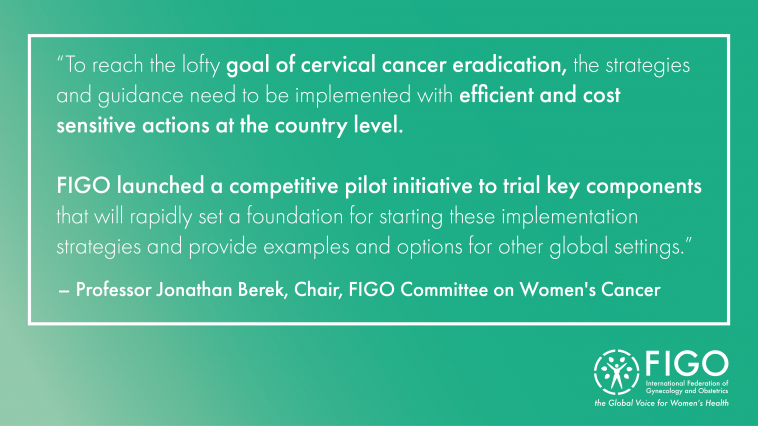World Cancer Day 2022: FIGO’s Commitment to Closing the Cervical Cancer Care Gap
On this World Cancer Day 2022, focused on the theme #CloseTheCareGap, we look at the steps FIGO and its partners are taking in the path towards the elimination of cervical cancer by addressing the global disparities in HPV prevention and cervical cancer treatment.

For World Cancer Day 2022, we are spotlighting FIGO’s Pilot Project to Eliminate Cervical Cancer, and the recently launched pilot grants which, in partnership with FIGO’s Member Societies, are taking essential steps on the path towards the global elimination of cervical cancer.
The WHO’s Cervical Cancer Elimination Initiative
Professor Joanna Cain, Past Chair and current member of WHO Guidelines Development Group (GDG) for Elimination of Cervical Cancer, reports on the current global situation of cervical cancer:
Cervical cancer kills more than 340,000 women globally each year, exceeding deaths from maternal mortality. In 2018, with the significant advances in science including HPV vaccination, HPV DNA testing, and other advancing technologies, the possibility of eradication of cervical cancer became a reality.
The WHO declared a campaign to eradicate cervical cancer in 2018. FIGO, with other organisations, signed on, confirming its support at the 2018 World Congress held in Rio de Janeiro. The WHO strategy focused on prevention with vaccination, elimination of precancers with screening, and availability of treatment for invasive cancers. The priority strategy is vaccination, which will eliminate 62 million deaths from cervical cancer over a century, and a global screening and treatment strategy to catch those who are beyond vaccination age.
– Professor Joanna Cain, Past Chair and current member of WHO Guidelines Development Group (GDG) for Elimination of Cervical Cancer
FIGO’s role in the global picture
FIGO, as the global voice for women’s health, has a key role to play in the Global Strategy for Elimination. The implementation of the Pilot Project to Eliminate Cervical Cancer is a key step in our strategic commitment to contribute to the elimination of this disease.
With the work of the WHO Guideline Development Group (to which FIGO sends representatives), new guidance for screening was published in July 2021. To reach the lofty goal of eradication, the strategies and guidance need to be implemented with efficient and cost sensitive actions at the country level. FIGO launched a competitive pilot initiative to trial key components that will rapidly set a foundation for starting these implementation strategies and provide examples and options for other global settings.
– Professor Jonathan Berek, Chair, FIGO Committee on Women's Cancer
Investigating cervical cancer elimination strategies in LMICs
More than 85% of annual deaths caused by cervical cancer occur in low- and middle- income countries (LMICs) and it is estimated that this will rise to 95% over time. Most LMICs do not have access to cervical cancer screening programmes or robust HPV vaccination, and most women in these countries present with advanced disease not amenable to surgery.
FIGO’s Pilot Project to Eliminate Cervical Cancer is supporting the development of evidence-based models of successful collaboration to enable the sustainable implementation of the WHO guidance for vaccination and screening.
From scoping opportunities for the communication and education of HPV vaccination to the development of a mobile app to enable both vaccination and self-sampling, these grants will generate robust, evidence-based models of successful collaborative structures for the sustainable implementation of the WHO guidance for vaccination and screening. Partnerships between each country’s national society and external partners will enable connections and capacity building to increase global knowledge surrounding the challenges and successes of implementation across settings.
The four projects selected to receive immediate funding are:
Colombian Federation of Obstetrics and Gynecology (FECOLSOG), Colombia – Implementation of screening and prevention of cervical cancer
End Cervical Cancer Nigeria Initiative (ECCNI), Nigeria – Capacity Building for Outpatient Clinics to Improve Adolescent Vaccine Uptake and Women’s Demand for Cervical Cancer Screening
The Federation of Obstetric and Gynaecological Societies of India (FOGSI), India – Augmenting Cervical Cancer Elimination Effectively in a Region utilizing Affordable TEchnology (ACCELERATE) to enhance cervical cancer screening services for achieving WHO Target goals in the North East Region of India
Nepal Society of Obstetricians and Gynaecologists (NESOG), Nepal – Implementation of screening and prevention of cervical cancer
A fifth project has also been granted funding, but will not be starting immediately for logistical reasons:
The Bengal Obstetric and Gynecological Society (BOGS), India – Integration of Smartphone in cervical cancer screening and Vaccination with Education dissemination (i–SERVE)
I am delighted that FIGO is able to support these projects, which are taking place on three continents through our Membership Societies, and will provide invaluable information to support further work. We were particularly excited by the high quality of the applications (over 40 in all) and are very much looking forward to seeing the results towards the end of 2022.
– Professor Mary Ann Lumsden, CEO of FIGO
Find more detailed information about each in-country pilot project.